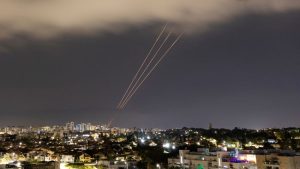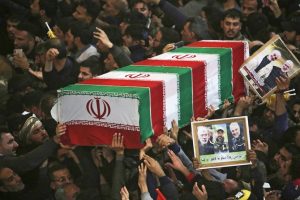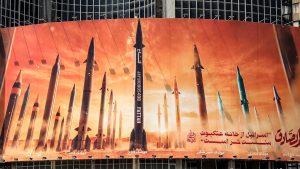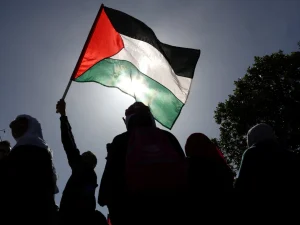Osman Softic || 17 April 2024
 Iran unleashed several hundred kamikaze drones and cruise and ballistic missiles on April 13, 2024 in its military operation dubbed ‘truthful promise,’ striking at various military targets in Israel. The Iranians claim this first direct strike ever on Israel was a justified response in retaliation for the terrorist attack Israel carried out on the Iranian Consulate in Damascus on April 1, 2024, thereby flagrantly violating international law. Israel destroyed the compound of the Iranian Consulate in Damascus killing Iranian diplomats and military personnel, including high-ranking generals Muhammad Reza Zahedi and his deputy Mohammad Haji Rahimi, among other victims. Therefore, this first Iranian attack on Israel from Iranian soil is viewed by Iran as a defensive act. Since the UN Security Council did not take action and adequate measures to sanction Israel, Iran was compelled to exercise its right to self-defense.
Iran unleashed several hundred kamikaze drones and cruise and ballistic missiles on April 13, 2024 in its military operation dubbed ‘truthful promise,’ striking at various military targets in Israel. The Iranians claim this first direct strike ever on Israel was a justified response in retaliation for the terrorist attack Israel carried out on the Iranian Consulate in Damascus on April 1, 2024, thereby flagrantly violating international law. Israel destroyed the compound of the Iranian Consulate in Damascus killing Iranian diplomats and military personnel, including high-ranking generals Muhammad Reza Zahedi and his deputy Mohammad Haji Rahimi, among other victims. Therefore, this first Iranian attack on Israel from Iranian soil is viewed by Iran as a defensive act. Since the UN Security Council did not take action and adequate measures to sanction Israel, Iran was compelled to exercise its right to self-defense.
The Permanent Mission of the Islamic Republic of Iran to the United Nations warned that this was a legitimate act of retaliation for violation of international law and Vienna Conventions on the inviolability of diplomatic missions and their personnel, and therefore represent a direct violation of Iranian sovereignty. Three western permanent members of the UN Security Council, France, USA and Great Britain failed to condemn the regime in Tel Aviv and did not take necessary measures against Israel, even though the Zionist regime has been committing genocide against the civilian population of Gaza for more than six months. In addition, Israeli military forces known as (IDF), have deliberately assassinated seven western humanitarian workers of the World Central Kitchen (WCK), who coordinated the distribution of humanitarian aid to the starving population of Gaza. The Aid workers were citizens of Poland, Canada, Great Britain, Australia, the USA and Palestine. With this arrogant and criminal murder of humanitarians the regime in Tel Aviv showed discontent to the US and its western allies, practically telling them that even they (protectors of Israel), had no right nor power to oppose the Netanyahu regime and its policies of deliberately starving the Gazans.
The WCK is an American humanitarian organization deemed to be close to the US military and political establishment and American corporate business community. However, this did not deter Israel from brutally murdering the people who have sacrificed their own lives to ensure the destitute and displaced people of Gaza are not left without necessary food for their survival. This act of Israeli state terrorism against humanitarians did not have any effect on the US government, or on other western powers backing Israeli genocide in Gaza, to condemn the Israeli attack on the Iranian consulate in Damascus. Therefore, Iran resorted to taking matters into its own hands by forcefully responding to Israel’s arrogant attack, after its apparent willingness to refrain from its legitimate response, provided Israelis immediately halted its genocide in Gaza.
 It is worth noting that Israel in the past few years carried out a series of assassinations of Iranian scientists (primarily experts for the nuclear program) and military officers and personnel in Syria and Iran, while the previous Trump administration ordered the assassination of general Qassem Soleimani, one of Iran’s most capable military strategists who directed the Quds force – regional Iranian arm of the Islamic revolutionary Guard Corps (IRGC) in Syria and Iraq. Suleimani operated in Iraq and Syria in the fight against ISIS/DAESH terrorist group, which had been defeated mainly thanks to the efforts of the Islamic Republic of Iran, Russia, the Iraqi forces and to a lesser extent by the western anti-ISIS coalition in Iraq. Soleimani was murdered while on his diplomatic mission to Baghdad. He was in civilian clothes and flew into Iraq from Syria at the invitation of the Iraqi Prime Minister. His mission is believed to have focused on establishing diplomatic ties between Iran and Saudi Arabia after a decade of strained relations and enmity between the two leading West Asian Muslim powers competing for primacy in the region.
It is worth noting that Israel in the past few years carried out a series of assassinations of Iranian scientists (primarily experts for the nuclear program) and military officers and personnel in Syria and Iran, while the previous Trump administration ordered the assassination of general Qassem Soleimani, one of Iran’s most capable military strategists who directed the Quds force – regional Iranian arm of the Islamic revolutionary Guard Corps (IRGC) in Syria and Iraq. Suleimani operated in Iraq and Syria in the fight against ISIS/DAESH terrorist group, which had been defeated mainly thanks to the efforts of the Islamic Republic of Iran, Russia, the Iraqi forces and to a lesser extent by the western anti-ISIS coalition in Iraq. Soleimani was murdered while on his diplomatic mission to Baghdad. He was in civilian clothes and flew into Iraq from Syria at the invitation of the Iraqi Prime Minister. His mission is believed to have focused on establishing diplomatic ties between Iran and Saudi Arabia after a decade of strained relations and enmity between the two leading West Asian Muslim powers competing for primacy in the region.
American policymakers and Israelis did not look favorably at Suleimani actively working on reconciliation of two neighboring major Muslim states, which was eventually achieved thanks to changed circumstances on the ground – the destruction of ISIS and the discrediting of the Operation Timber Sycamore (western arming of terrorists in Syria and Iraq), major policy changes in Saudi Arabia and clever mediation efforts by Oman and Iraq, and indeed due to diplomatic prowess of the People’s Republic of China, which ultimately weighed in, enabling the agreement on the normalization of relations between Riyadh and Tehran be signed under the auspices of Beijing.
The agreement was in the interest of both countries and long-term peace, stability and economic prosperity of the entire West Asia. This, of course, did not seem to favor the narrow interests of western powers nor those of expansionist Israel, a militarized state eying for regional hegemony under the US stewardship and protection. Both Washington and Tel Aviv have been profiting from divide and rule policies for decades, while blaming local non-state actors and Iran for the alleged destabilization and spread of malignant influence, the Shia crescent and other fabrications, even though Iran consistently claimed to be at home in its geographic region while seeking wholistic approach to region-based security architecture. Afterall, it was one of the major purposes of forming the Gulf Cooperation Council (GCC), back in 1981, after consolidation of the Islamic revolutionary government in Iran, to serve as instrument of western powers and their Gulf vassal sheikhdoms, to cement the division of the region while demonizing and destabilizing Iran, and using it for its encirclement, isolation and even destruction by providing support to Saddam’s aggression against Iran.
Ample evidence has by now emerged to substantiate the claims that ISIS (DAISH) and other related and sometimes rival terrorist extreme JIHADIST armed groups in Iraq and Syria, such as Jaish al-Islam and Jabhat Al Nusra, have received support by western intelligence agencies, Israel, Jordan and of other Arab monarchies of the Gulf, which armed, used or manipulated ISIS as vehicle for achieving their respective geostrategic goals in West Asia – but mainly to weaken Iran and its influence in the region Iran considers important for its strategic depth doctrine, upon which Iran’s defense is based. Iran employed what John Mearsheimer would call offensive realism strategy to oppose the US, Israeli and its Arab neighbors attempts at destabilizing it the aim of which was to ultimately overthrow Iran’s Islamic revolutionary government and bring Iran back under control of western and Israeli influence, to get hold of Iran’s enormous energy resources and to exploit its strategically important territory without whose control it is not possible to maintain American hegemony in West Asia and further afield.
According to one of Iran’s leading geopolitical analysts, Mohammad Marandi, Iran has sent a clear message to the Zionist regime in Tel Aviv that Tehran will not hesitate to respond again with an even stronger force on military targets in Israel if Tel Aviv decides to retaliate against Iran. Marandi says that “Iran will respond with precise and powerful strikes”. He also claimed Iran used only a small part of its military arsenal. Iran claimed its response was proportionate, limited and restrained, but that it achieved its stated objectives in terms of retaliation for the Israeli attack in Damascus and numerous earlier actions by Israel on Iranian scientists, military commanders and assets in Iran.
It is a rather positive gesture that the US President Joe Biden said that he would NOT support Israel in attacking Iran if Netanyahu’s right-wing Israeli regime decides on such a risky move. By doing so, Biden let the Israeli prime minister know that he crossed what seems to be the American red line, and that he can no longer count on having unconditional support from Washington in his adventurous campaigns that threaten not only to destabilize the entire region but pose a serious threat to world peace. The US forces “helped Israel intercept almost all incoming drones and missiles”. According to media reports the Hashemite Kingdom of Jordan and Great Britain have also provided assistance to Israel as has France. According to information published by Axios, Biden told the Israeli prime minister that the US would not participate in any offensive operations against Iran.
 It is difficult to determine how much damage Iran caused to the Israeli military infrastructure it targeted. Perhaps Iran was satisfied with a symbolic attack aimed at causing serious psychological damage to the population of Israel, 80 percent of whom allegedly supports the Israeli genocide against the Palestinians of Gaza. There is a school of thought that claims that Iran, after the Israeli terrorist act of bombing the Iranian consulate in Damascus, wanted to “preserve credibility” among its citizens and allies in the Axis of resistance front in the region (forces that claim to resist the Israeli genocide against the Palestinians and expansionism of Israel and US hegemony in West Asia). The protagonists of this line of reasoning believe that Iran transparently announced its retaliation plans in order to prevent unnecessary death of civilians in Israel and to prevent further escalation.
It is difficult to determine how much damage Iran caused to the Israeli military infrastructure it targeted. Perhaps Iran was satisfied with a symbolic attack aimed at causing serious psychological damage to the population of Israel, 80 percent of whom allegedly supports the Israeli genocide against the Palestinians of Gaza. There is a school of thought that claims that Iran, after the Israeli terrorist act of bombing the Iranian consulate in Damascus, wanted to “preserve credibility” among its citizens and allies in the Axis of resistance front in the region (forces that claim to resist the Israeli genocide against the Palestinians and expansionism of Israel and US hegemony in West Asia). The protagonists of this line of reasoning believe that Iran transparently announced its retaliation plans in order to prevent unnecessary death of civilians in Israel and to prevent further escalation.
There seems to be a consensus among analysts that Tel Aviv attacked the Iranian consulate purposefully in order to draw the US into a direct armed conflagration with Iran, to prolong the genocidal war in Gaza, to divert attention from Israel’s defeats by Hamas on the battlefield, to blunt the edge of global pro-Palestinian protests around the world, and to blame everything on Iran as a “culprit that should be punished” for the alleged aggression and destabilization of the region, which can be clearly seen in the condemnations of Iran by western countries which, by the way, did not find it necessary to condemn Israel for genocide, nor to hold it accountable even after the killing of western humanitarians in Gaza. Such western government’s attitude only bolsters the claims of the global public that views it as yet another open manifestation of hypocrisy of the western political power centers, which have uncritically long since become hostages of powerful Israeli interests.
After all, this is the first time that Iran has attacked Israel from its own territory, and the psychological impact of that act cannot be underestimated. Iran’s intention, therefore, could be interpreted as a desire to signal to Israel and its helpers in genocide what Iran is capable of doing but on a much larger scale, in case Israel does not learn a lesson and repeats similar attacks, murders and provocations against Iran. It could also mean that with this act Iran managed to restore the balance of deterrence and that, in addition to retaliation, this was the main goal of this Iranian carefully calculated, limited and restrained attack on Israel, rather than irrational desire to inflict disproportionate damage by destroying infrastructure or killing innocent civilians in Israel. If this assumption is correct, then the US correctly interpreted the signal from Iran that it does not want a regional escalation of the war, and that it understands very well that Iran could have carried out much stronger strikes if it wanted to, or that it could do so if forced by reckless “tit-for-tat” moves by Israel.
 Therefore, one may conclude that the military objective of Iran’s response was precisely calculated, effective and proportionate. It was an attack that was designed to have a strong psychological effect because it stunned the Israeli population which could not imagine it until it happened. Either way, the next few days could be crucial. Israel’s possible compliance with the US request not to carry out conventional retaliation inside Iran would suggest that an atmosphere of restoration of deterrence has been established, favoring the claim that the Islamic Republic has achieved a strategic victory over Israel. However, if Israel decides to attack Iranian targets on Iranian territory, against the will of the US, it would mean that deterrence has not been achieved, or that the Israeli prime minister wants to escalate the situation at any cost for personal or political reasons in order to preserve the coalition government, which is under the threat of even bigger extremists who seek revenge on Iran, continuation of the genocide, and invasion of southern Gaza (Refah), this then carries a great risks not only for Israel but for the entire region. The risk of a possible further escalation of the conflict would be increased and could get out of control. At this point, it would be best for Israel to refrain from further escalation.
Therefore, one may conclude that the military objective of Iran’s response was precisely calculated, effective and proportionate. It was an attack that was designed to have a strong psychological effect because it stunned the Israeli population which could not imagine it until it happened. Either way, the next few days could be crucial. Israel’s possible compliance with the US request not to carry out conventional retaliation inside Iran would suggest that an atmosphere of restoration of deterrence has been established, favoring the claim that the Islamic Republic has achieved a strategic victory over Israel. However, if Israel decides to attack Iranian targets on Iranian territory, against the will of the US, it would mean that deterrence has not been achieved, or that the Israeli prime minister wants to escalate the situation at any cost for personal or political reasons in order to preserve the coalition government, which is under the threat of even bigger extremists who seek revenge on Iran, continuation of the genocide, and invasion of southern Gaza (Refah), this then carries a great risks not only for Israel but for the entire region. The risk of a possible further escalation of the conflict would be increased and could get out of control. At this point, it would be best for Israel to refrain from further escalation.
No one can predict in which direction things will unfold in the coming days and weeks. What is most necessary is a permanent ceasefire, an end to genocide in Gaza, the opening of humanitarian corridors, return of expelled Palestinians, exchange of all prisoners and hostages, reconstruction of Gaza and the search for a lasting political solution in the interest of justice and peace for Palestine.
 Osman Softić is a Research Fellow at the Islamic Renaissance Front. He holds a BA degree in Islamic Studies from the Faculty of Islamic Studies of the University of Sarajevo and has a Master degree in International Relations from the University of New South Wales (UNSW). He contributed commentaries on Middle Eastern and Islamic Affairs for the web portal Al Jazeera Balkans, Online Opinion, Engage and Open Democracy. Osman holds dual Bosnian and Australian citizenship.
Osman Softić is a Research Fellow at the Islamic Renaissance Front. He holds a BA degree in Islamic Studies from the Faculty of Islamic Studies of the University of Sarajevo and has a Master degree in International Relations from the University of New South Wales (UNSW). He contributed commentaries on Middle Eastern and Islamic Affairs for the web portal Al Jazeera Balkans, Online Opinion, Engage and Open Democracy. Osman holds dual Bosnian and Australian citizenship.

